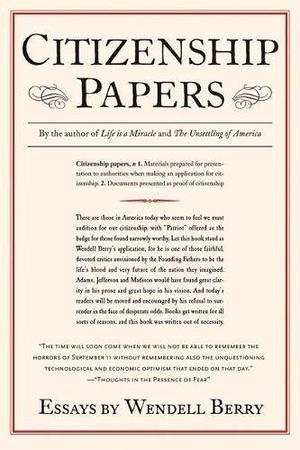
Our times are uneasy, Berry (Jayber Crow, 2000, etc.) states; critical elements of the American democratic tradition are being lifted wholesale from the foundation and carted away in broad daylight. A case in point is our new national-security policy, which “depends on the acquiescence of a public kept fearful and ignorant, subject to manipulation by the executive power, and on the compliance of an intimidated and office-dependent legislature.” That ignorance will spell our doom, as will the “selfishness, wastefulness, and greed that we have legitimized here as economic virtues.” Berry doesn’t flinch when exhorting us to meet “the responsibility to be as intelligent, principled, and practical as we can be.” His agrarian argument, which he has been making and remaking for decades, requires the recognition of our dependence on and responsibility to nature, and the concomitant responsibility for human culture.
Industrial culture is an accidental by-product of the ubiquitous effort to sell unnecessary products for more than they are worth.
[A]group of young men calling themselves “Twelve Southerners” published a book [1930] unique in American literature. Entitled I’ll Take My Stand, the book contained an essay by each of the twelve:…
The twelve essays that follow “A Statement of Principles” vary considerably in quality, in readability, and in what might be called their arguability. That surviving agrarians (and others too) may find them interesting, instructive, useful, and in some ways indispensable does not set them beyond the need for exacting criticism.

There is not a lot of poetry that I like but when it rhymes I do.
Boomer Johnson
by Henry Herbert Knibbs
Now Mr. Boomer Johnson was a gettin’ old in spots,
But you don’t expect a bad man to go wrastlin’ pans and pots;
But he’d done his share of killin’ and his draw was gettin’ slow,
So he quits a-punchin’ cattle and he takes to punchin’ dough.
Our foreman up and hires him, figurin’ age had rode him tame,
But a snake don’t get no sweeter just by changin’ of its name.
Well, Old Boomer knowed his business – he could cook to make you smile,
But say, he wrangled fodder in a most peculiar style.
He never used no matches – left em layin’ on the shelf,
Just some kerosene and cussin’ and the kindlin’ lit itself.
And, pardner, I’m allowin’ it would give a man a jolt
To see him stir frijoles with the barrel of his Colt.
Now killin’ folks and cookin’ ain’t so awful far apart,
That musta been why Boomer kept a-practicin’ his art;
With the front sight of his pistol he would cut a pie-lid slick,
And he’d crimp her with the muzzle for to make the edges stick.
He built his doughnuts solid, and it sure would curl your hair
To see him plug a doughnut as he tossed it in the air.
He bored the holes plum center every time his pistol spoke,
Till the can was full of doughnuts and the shack was full of smoke.
We-all was gettin’ jumpy, but he couldn’t understand
Why his shootin’ made us nervous when his cookin’ was so grand.
He kept right on performin’, and it weren’t no big surprise
When he took to markin’ tombstones on the covers of his pies.
They didn’t taste no better and they didn’t taste no worse,
But a-settin’ at the table was like ridin’ in a hearse;
You didn’t do no talkin’ and you took just what you got,
So we et till we was foundered just to keep from gettin’ shot.
When at breakfast one bright mornin’, I was feelin’ kind of low,
Old Boomer passed the doughnuts and I tells him plenty:
“No, All I takes this trip is coffee, for my stomach is a wreck.”
I could see the itch for killin’ swell the wattle on his neck.
Scorn his grub? He strings some doughnuts on the muzzle of his gun,
And he shoves her in my gizzard and he says, “You’re takin’ one!”
He was set to start a graveyard, but for once he was mistook;
Me not wantin’ any doughnuts, I just up and salts the cook.
Did they fire him? Listen, pardner, there was nothin’ left to fire,
Just a row of smilin’ faces and another cook to hire.
If he joined some other outfit and is cookin’, what I mean,
It’s where they ain’t no matches and they don’t need kerosene.